#René Echevarria
Text
First time you felt seen by Star Trek?

The episode: DS9-- ‘Rejoined’
What I knew: I knew I was queer, had since I was four years old.
What I saw: A trans person! Who wasn’t a psychotic criminal! who had a lover of the same current gender. And her friends were fine with both of these things!! They loved her anyway!! On tv!!!! On my favourite Star Trek show, with the character I understood the most. I’d never seen that before!! I’d never seen someone talk about gender so fluidly as Jadzia. I’d always felt represented by Dax, but seeing her wlw relationship accepted by everyone around her blew my mind. Many things clicked into place for me the night of 30 October 1995. I cried. Teenager me was in puddles. Adult me puddles every time.
Director: Avery Brooks
Writers: Ronald D. Moore, René Echevarria
Story by: René Echevarria
Thank you for that moment, DS9. You made me felt seen for the first time, possibly ever.
#ds9#rejoined#the first time I saw a trans person on tv and one who had a lover of the same sex and they weren't criminals or crazy#terry farrell#was phenomenal#Avery Brooks#Ronald D. Moore#René Echevarria#I always knew I was queer but because of Rejoined#I realised I was trans#queer#gay#lgtbqia+#star trek#Jadzia Dax#that episode changed my life#what was the episode of Star Trek you felt truly seen?#please reply with gifs if possible I really love gifs#and her friends were there for her and accepted her so you know what that felt like#teenager me was in puddles#adult me still puddles#you have to understand up until that time every time a trans person was on TV they were psychotic criminals#when was the first time you felt seen by Star Trek?#star trek first canon queer relationship
71 notes
·
View notes
Text
Idly thinking about the brilliance of TNG's Lower Decks, so please do bear with me for a little while here... The show's seventh season often gets a not entirely unjustified rap as being a piece of filler while various parts of the writer's room were off shepherding the launch of Voyager and the transition to film with Generations, but here at last the season manages to attain the lofty heights of exactly what we expect from the "final season" of a show like this, in a fashion far more satisfying than simple continuity references or closure to running plot threads could ever be.
What I mean is that it demonstrates the inherent perks of the writer's room as a model of television production, something that has kind of been lost in the age of streaming and micro-writer's rooms. There isn't enough space for someone like, say, Brannon Braga with his weird exploration of body horror and/or temporal fuckery, or Ronald D. Moore with his cynical realpolitik.
Lower Decks very much hinges on René Echevarria's proven talents as one of the strongest writers in the TNG stable when it comes to intimate, character-driven pieces. The pitch came from outside the writer's room, but that hints at the real function of the room as a machine, whereby an abstract idea is subjected to a very particular finesse that helps bring out particular facets of a given script.
Ironically, Echevarria's own Star Trek career is another instructive proof-of-concept in this regard. His first script was The Offspring, but it was given an extensive do-over by Michael Piller and Melinda Snodgrass to better fit the aesthetics of the show. And here, his talents have developed far enough that he's effectively put on the other end of the process.
And it works. The script is beautifully constructed, with so many clever bits that invite the audience to become an active participant in the very procedure of watching Star Trek. The Alaska/Canada screw-up from Lavelle and Ben, the decision to cut away from the transport of Joret Dal and only show the hint of a Cardassian uniform, and of course the central set piece of the intercut poker games. (Here, for the visual triumphs, we should also commend director Gabrielle Beaumount.)
The episode derives its power from the audience's understanding that there were 165 episodes before this one, with their own rhythms and cadences. It disrupts it, but ultimately, in Worf's mutual connection with the lower decks personnel at the very end, collapses the narrative back into its familiar form. Of course, like all good narrative collapses, it comes at a cost, namely that of Ensign Sito.
It's brutal, and soul-crushing, to have spent so much time with this character only to have her swept away by the vicissitudes of fate, but it never feels cynical.
(In fact, one of the more bitterly memorable moments in watching the episode with my parents tonight - who had not seen the episode, or at least not recently - was my mother worriedly voicing her suspicions that Sito was not slated for a happy ending, and my father noting how bleak it would be for them to bring back this character to tell such a story. Crucially, he did not say this to disapprove, and I think it speaks volumes to how much Echevarria's script relies on the audience applying the televisual grammar of Star Trek to the episode.)
I'll admit I haven't seen any of the more modern Trek shows beyond Season 2 of Discovery - not out of conscious choice, mind you, I just have only so many hours of the day to watch Star Trek - but I can absolutely understand why this was the episode that got to pretty much single-handedly inspire the concept of an entire show, even if only in spirit.
For a show that can often feel rather formulaic - which isn't a problem, because the formula is a very, very good one that leads to some fantastic episodes - Lower Decks is proof that TNG wasn't *entirely* content to just coast by and rest on its laurels. It would have been justified to do so, but it still threw in the odd stylistic leap here and there.
And in so doing, it inadvertently prefigures more experimental modern television techniques - and contrasting against some of the more frustrating tendencies of the streaming era - all amidst a genuinely heartfelt and moving story. With all due respect to The Pegasus, Parallels and All Good Things, for me I think Lower Decks has now emerged as the champion of Season 7.
It's just that fantastic.
26 notes
·
View notes
Text
Raunch Review: Carnival Row
Raunch Review: Carnival Row
Raunch Reviews is a series about profanity. Not real profanity, but speculative swearing. Authors often try to incorporate original, innovative forms of profanity into our own fantastical works as a way to expand the worlds we build. Sometimes we’re successful. Often we’re not. In this series, I examine the faux-profanity from various works of sci-fi and fantasy, judge their effectiveness, and…

View On WordPress
#amazon#carnival row#fantasy#faux-profanity#language#rené echevarria#slang#speculative fiction#steampunk#travis beacham
1 note
·
View note
Text
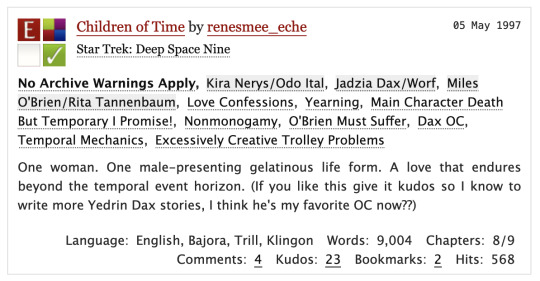




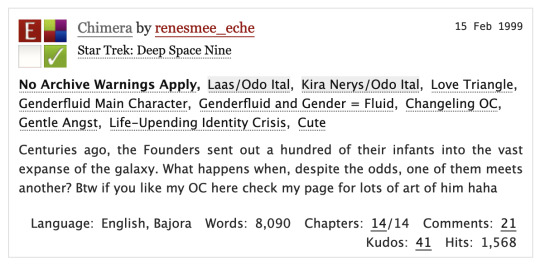

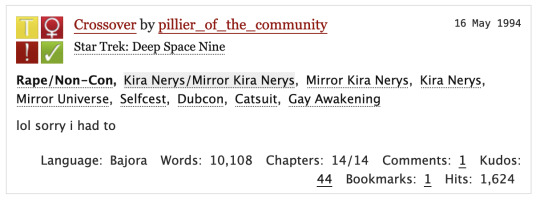
ever think about how ficcy ds9 is
#the sheer number of these robert hewitt wolfe and rené echevarria wrote#ds9#deep space nine#garashir#daxworf#kiraodo#kiracest#quodo#and i didn't even do heart of stone#or waltz#or change of heart or fascination or penumbra or or or
278 notes
·
View notes
Text
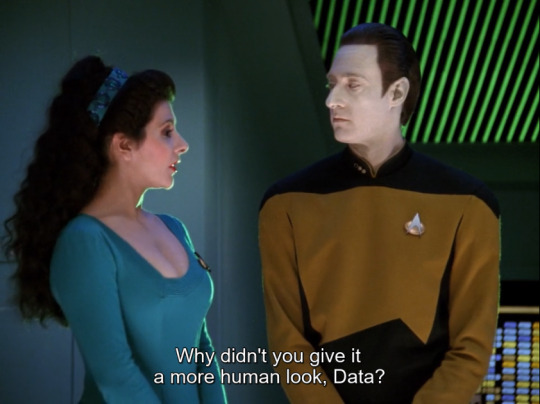
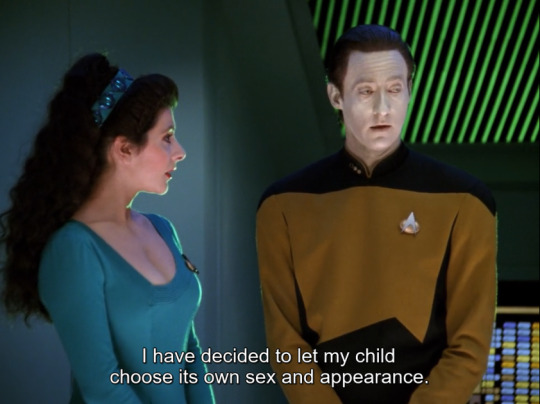
TNG 3x16
#it is for this and many other reasons that data is a patron saint of this site#rené echevarria writing this episode: tumblrinas in thirty years are gonna love this one
74 notes
·
View notes
Text
In this early draft [of "Tears of the Prophets"], Dukat has an Orb that he has stolen from Deep Space 9 and a chroniton generator (as opposed to the chroniton bomb mentioned on the beat board). After flying into the wormhole, he opens the Orb and confronts the Prophets. Then he activates the generator, which begins to kill the Prophets in much the same way as the Keiko/Pah-wraith intended in a previous episode, "The Assignment." In the meantime, Dax finds that Dukat has stolen the Orb and follows him into the wormhole, leading to a scene that [René] Echevarria recalls clearly. "Dax beams into Dukat's ship and sees the open Orb case,"' he recounts. "Then we return to Dukat's point of view, from within this disorienting Orb experience, in which he's being approached by the various Prophets in human form. The Sisko/Prophet approaches Dukat and says, 'What are you doing? You're killing us,' and Dax approaches to say something Prophet-like. Then she punches him and you realize that it's not a Prophet at all,'' he says, laughing at the thought of the unproduced scene. "It was a neat gag. She punches him and sets him down. So basically, Dax manages to stop Dukat from killing the Prophets completely, but she gets killed in the process. That was the first draft. The story changed a lot in the second."
from Star Trek: Action! by Terry J. Erdmann (1998)
#BRO. DO NOT TELL ME THIS.#it would've so much cooler and more heroic than what we got :(#star trek action#ds9#jadzia dax
157 notes
·
View notes
Text
“Back in the 21st century, however, not everything was rosy. Indeed, the two-part "Star Trek: Deep Space Nine" episode "Past Tense" (January 2 and 9, 1995) threw its main characters back in time — via a transporter accident — to the year 2024 when everything seemed to be at its worst. Earth in 2024 was overrun with poverty, and Captain Sisko (Avery Brooks) had to explain to Dr. Bashir (Alexander Siddig) that housing insecurity had reached epidemic proportions. Indeed, the population of unemployed and unhoused people in major cities had reached such high levels, that the American government had built special "Sanctuary Districts" where the unhoused were rounded up and imprisoned in a ghetto.
The mentally ill weren't treated, and the hungry were fed with a malfunctioning rationing system. It wouldn't be until an activist named Gabriel Bell rose up in protest and led a riot against the police that conditions would change. The Bell Riots were said to be a significant part of Trek's history.
Given the recent news that Governor Gavin Newsom has signed an executive order to sweep the state of unhoused encampments, "Past Tense" — set in 2024 — is beginning to feel weirdly prescient.
Housing insecurity and homelessness, it should be said, is a serious problem in California. Rents are high, and there is little effort made to provide low-cost housing or shelters for the state's many unhoused citizens. At last count, there were over 181,000 unhoused people in the state, 28% of the entire country's unhoused population. Many people live in tents, often set up under freeways or other sheltered areas, and form miniature encampments. There is little sanitation in such encampments, and the quality of life isn't great. Every so often, the police department is called in to sweep these encampments off the streets, forcing the people to move on to another neighborhood. However, they are not taken to shelters but merely told to go elsewhere. They then set up camps under another freeway and the cycle continues.
On July 25, Gavin Newsom signed an order that would only exacerbate the problem, an order stemming from a Supreme Court Decision that allowed states to ban public sleeping at their own discretion. While Newsom has pledged billions of dollars to build shelters, the measure to "sweep the streets" of encampments has been called a wonton and unhelpful measure by critics.
It's a strange coincidence that "Star Trek" should have written a story, back in 1995, about how 2024 will be the year the housing insecurity problem in the United States will boil over. Gavin Newsom has essentially signed a measure that opens the door for the cruel "Sanctuary Districts" seen in "Deep Space Nine." If Newsome is a "DS9" fan, he seems to have taken the wrong lessons from "Past Tense."
(…)
On the DVD commentary track for "Past Tense," the episode's writers — Robert Hewitt Wolfe, Ira Steven Behr, and René Echevarria — said they were inspired by a previous mayor's actions. The Republican Richard Riordan (who was mayor of Los Angeles from 1993 to 2001) suggested in the early 1990s that the city build what he called "havens" for the city's homeless, essentially herding them into tent cities. Riordan said he wanted to keep the streets clear because it was good for local businesses, but he never suggested how these fenced-off "havens" were meant to be run, or how the homeless insides of them were to be helped.
The writers of "Deep Space Nine" were trying to invent a fictional, near-future scenario where the world was too far gone to save. Outside their windows, politicians were merely suggesting it in real life.
While Newsom's new measure doesn't spell out the same kind of "havens" that Riordan suggested, it is uncanny that the new homelessness measures should come tumbling down the pipeline in 2024, when "Past Tense" takes place. We'll have to wait to see if Gabriel Bell is also real. It's starting to feel like it.“
#star trek#deep space nine#deep space 9#star trek ds9#2024#homlessness#homeless#unhoused#california#gavin newsom
44 notes
·
View notes
Text
Magnifying Glass: "Explorers"
Episode: "Explorers"
Series: Star Trek: Deep Space Nine
Season 3, Episode 22
Original Air Date: May 8, 1995
Teleplay Writer: René Echevarria
Screenwriter: Hilary J. Bader
Director: Cliff Bole

“Explorers” provides a window into which we, the audience, peer and see dimensions of Sisko’s character and his relationship with Jake that he is not often allowed to nurture. He’s the captain of a space station; he’s busy at all times of the day with the demands of his crew, of the governments of Bajor and Cardassia and with the imminent threat of invasion from the elusive yet brutal Dominion. In this episode, Sisko gets the time to spend doing something he is purely passionate about, exercising his creativity and the side of him that’s a big history nerd (”Why [build an ancient Bajoran lightship by hand]? Because it’ll be fun!”). We also get to see him spend some quality time with his son, Jake.
For a project of mine exploring Afrofuturism and Black masculinity, I chose this episode as one of three to study and analyze under Sisko’s importance as a character not just within the Star Trek franchise but in the broader world of television.
Benjamin Sisko’s role as a Black father is particularly pertinent to the plot of “Explorers”. Star Trek: Deep Space Nine first aired in 1993, not far removed from the hell that was the Reagan Administration. Reagan contributed grossly during his presidency to the denigration and humiliation of popular notions of the Black family and the framing of Black Americans as criminals. Mainstream films and television during and before the era, if they include Black characters at all, portray Black men as aggressive, violent and insolent, an image very much in line with Reagan’s manipulative message. Avery Brooks’ casting in Deep Space Nine as it’s Starfleet commander was an historic first for the Star Trek franchise and a step against the popular stereotypes of “welfare queens” and “absent Black fathers.” Ben Sisko - whose most defining characteristic aside from being the commander and later, captain of a space station is being a father to his son Jake - completely demolishes the “absent Black father” stereotype and all the others, firstly, by just existing. Sisko is very present in Jake’s life. Even with his duties keeping him at the station’s beck and call, he makes the time he spends with his son an unconditional priority and is quick to assure Jake of that fact. The two of them share common interests in cooking and baseball, threads that bind them to each other and to Jake’s grandfather, Joseph, who owns and runs the family restaurant back on Earth. Sisko is diligent in his care of Jake as he is for all that he loves. He is an actively loving, caring, protective and supportive father every step of the way. Sisko’s strong sense of justice means that Jake can’t really get away with his and Nog’s various shenanigans, but he is lenient and fair and always there to comfort Jake when anything goes wrong. There are multiple moments throughout the series in which they both learn from each other (this episode being one of them): a quality of their relationship that Sisko warmly welcomes. It is Jake’s care for and faith in his Ferengi friend that helps Nog earn Sisko’s respect. Their closeness allows them to have difficult conversations, to resolve arguments in a place of understanding and compassion, to be vulnerable with one another unconditionally. While initially disappointed when Jake tells him he’d rather be a writer than follow in his father’s footsteps by enrolling in Starfleet Academy, Sisko is ultimately supportive of his son’s interests because all he wants is for Jake to be safe and happy. Which is where this episode picks up from the last time the two of them discussed Jake’s future.

At this point in the series, Jake is ready to apply to college and has been hard at work writing pieces to submit to schools he’s interested in. Yet, even with his father’s enthusiastic blessing to pursue what brings him joy, Jake is hesitant to share his acceptance to Pennington back on Earth. Not because he thinks his father will be angry with him about going behind his back but because he doesn’t want his dad to be alone. By no means would they be losing each other to this new stage of Jake’s life. However, it would be the longest time they’ve spent truly apart from each other and they wouldn’t even be in the same region of space. They certainly won’t be able to go off on impromptu trips in ancient space ships on a whim or watch historical baseball games in the holosuites together as often as they do on DS9. And above all, what this episode most emphasizes is their father-son relationship, this relationship in which they are each other’s security in a turbulent, violent world that placed them at the threshold of a wormhole in the middle of a war-torn sector of the galaxy directly after losing Jake’s mother and Ben’s wife, Jennifer. Whether or not either of them are ready for it, Jake going off to Pennington means that that security in each other will change. Hence Jake’s ultimate decision to defer admission for a year to spend more time with his father and gather more experiences to write about.
This episode showcases our hero doing exactly what Starfleet is all about: exploring the cultures of other worlds and engaging with their ways of knowledge. At the same time, he is beginning an exploration of what life will be like with Jake off at school (and what life will be like with a beard) and he is also getting an insight into his son’s inner world. Both are journeys the two of them embark on together, even if one must be undertaken across many lightyears of space.

Sisko stands out as an intentionally Black character against the backdrop of the undeniably important if, comparatively, rather flat representation in Lt. Nyota Uhura and Lt. Geordi LaForge. Deep Space Nine’s writers and Avery Brooks made a conscious effort to ensure that Benjamin Sisko’s Blackness was not simply seasoning sprinkled sparsely on top of his character, but instead the essential binding factor that brought all the elements of the Captain’s personality together. Not only do we know he has his family’s Creole restaurant to thank for his cooking skills, but we get to see him be at home and with family more than once in this series. And aside from what is clearly directly tied to his Blackness, he has other interests and hobbies, like baseball, building, art and studying ancient technologies. He uses his experience as a Black man and father and his deep knowledge of Black Earth history to inform his actions multiple times throughout the series (i.e. “Far Beyond the Stars”, “Past Tense“, “Badda-Bing, Badda-Bang”, “The Abandoned”, “By Inferno’s Light”, “Waltz” and “The Maquis”, to name a few). In this episode, we even see him wearing a top inspired by West African dashiki patterns.
Commissioned on Deep Space Nine, his identity as a Black man, even in the supposedly utopian Federation, positions him as someone able to sympathize with the Bajorans in a way that none of his contemporaries Kirk, Picard, Archer, Pike, Lorca or Janeway ever could: both his people and theirs have histories of violent systemic oppression and persecution, as well as continuously developing histories of liberation. He understands their need to reclaim their land, knowledge and ways of life because that is what his ancestors began and saw through. And it is what he, Jake, Joseph and Kasidy, their descendants, carry on and embody in the 24th century. He builds the Bajoran lightship in order to prove that the ancient Bajorans were capable of such technological prowess as to get all the way to Cardassia without a warp drive despite dubiety from both his coworkers and the Cardassians themselves. So not only does he connect with the Bajorans’ struggles in a way that a white human captain cannot, but he actively participates in bolstering the repatriation of their culture and history. Little wonder why the Prophets chose him as their Emissary.
#star trek#star trek ds9#ds9#deep space nine#benjamin sisko#ben sisko#captain sisko#benny russell#avery brooks#jake sisko#joseph sisko#kasidy yates#jennifer sisko#nog#bajoran lightship#black masculinity#black fatherhood#afrofuturism#fuck reagan#racial stereotypes#nyota uhura#geordi laforge#james t kirk#jean luc picard#jonathan archer#christopher pike#gabriel lorca#kathryn janeway#s3e22#explorers
11 notes
·
View notes
Note
🖖 and ❤️ for the ask game?
🖖 First Trek media I encountered?
I found Trek all on my own through syndicated TV. They replayed TNG every night at 11, and for the longest time, TNG was my only Trek. I didn't really know anyone else who watched it until about a year or so ago. Now I own René Echevarria's script from the episode that hooked me for good, which is completely insane to me.
❤️ Your Star Trek comfort character?
Hands down its Captain Kathryn Janeway of the Federation Starship Voyager. I don't know if I can fully put into words what Janeway means to me...
For this ask game
12 notes
·
View notes
Text
Star Trek Historical Event HAPPENING THIS YEAR
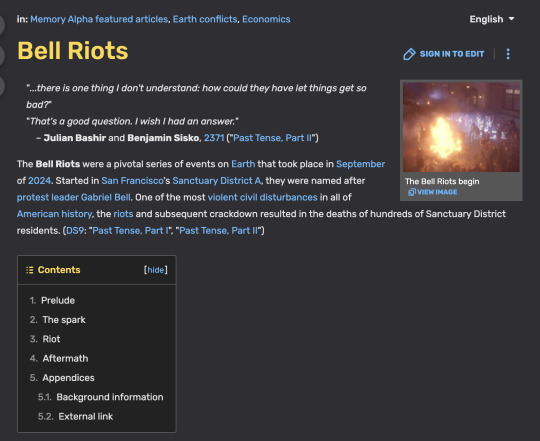
Star Trek predicting the future again?
The conceptualization of the Bell Riots began after Robert Hewitt Wolfe suggested doing a DS9 episode about homelessness. Even though he and Ira Steven Behr tried several ways of doing the story, they were particular about what form the protest against homelessness would take. René Echevarria recalled, "We certainly didn't want to do a Martin Luther King, which would have been an obvious way to go. We didn't want to have Sisko leading a march or a protest." (Captains' Logs Supplemental - The Unauthorized Guide to the New Trek Voyages, p. 89)
Ultimately, the writers based the Bell Riots on two historical incidents, both of which took place in the early 1970s: the Kent State shootings of anti-war protesters in 1970 and the Attica Prison riot in 1971. Whereas the reactions to the former event had had a major impact on Ira Steven Behr, his idea of basing the protest on the Attica Prison riot was also a major influence on the DS9 story itself. Behr stated, "I was driving home one evening, and I suddenly thought, 'Attica.' I came in the next day and told Robert, 'I hope you like it, because I think this is the way we have to do it – we're gonna do concentration camps." (Star Trek: Deep Space Nine Companion (p. 196)) Of the Kent State shootings, Behr remembered, "Once they started shooting down American college students, everyone I knew who was still pro-war said, 'Maybe we should just end this damn thing.' And many of the counterculture kids, ironically, said, 'If they're gonna shoot us, screw the revolution. Let's become accountants.' It had a big impact on me, and I got the idea of doing a combination of Kent State and an Attica [prison]-type siege, starting with the question: What would happen if the government started putting these people in camps? How would society deal with that or rationalize it? How would the homeless people deal with it?" (Captains' Logs Supplemental - The Unauthorized Guide to the New Trek Voyages, pp. 89-90)
5 notes
·
View notes
Text
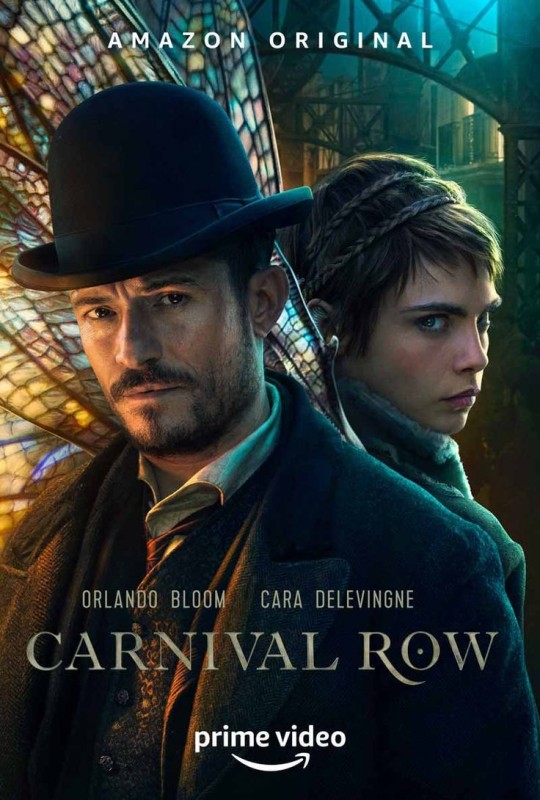
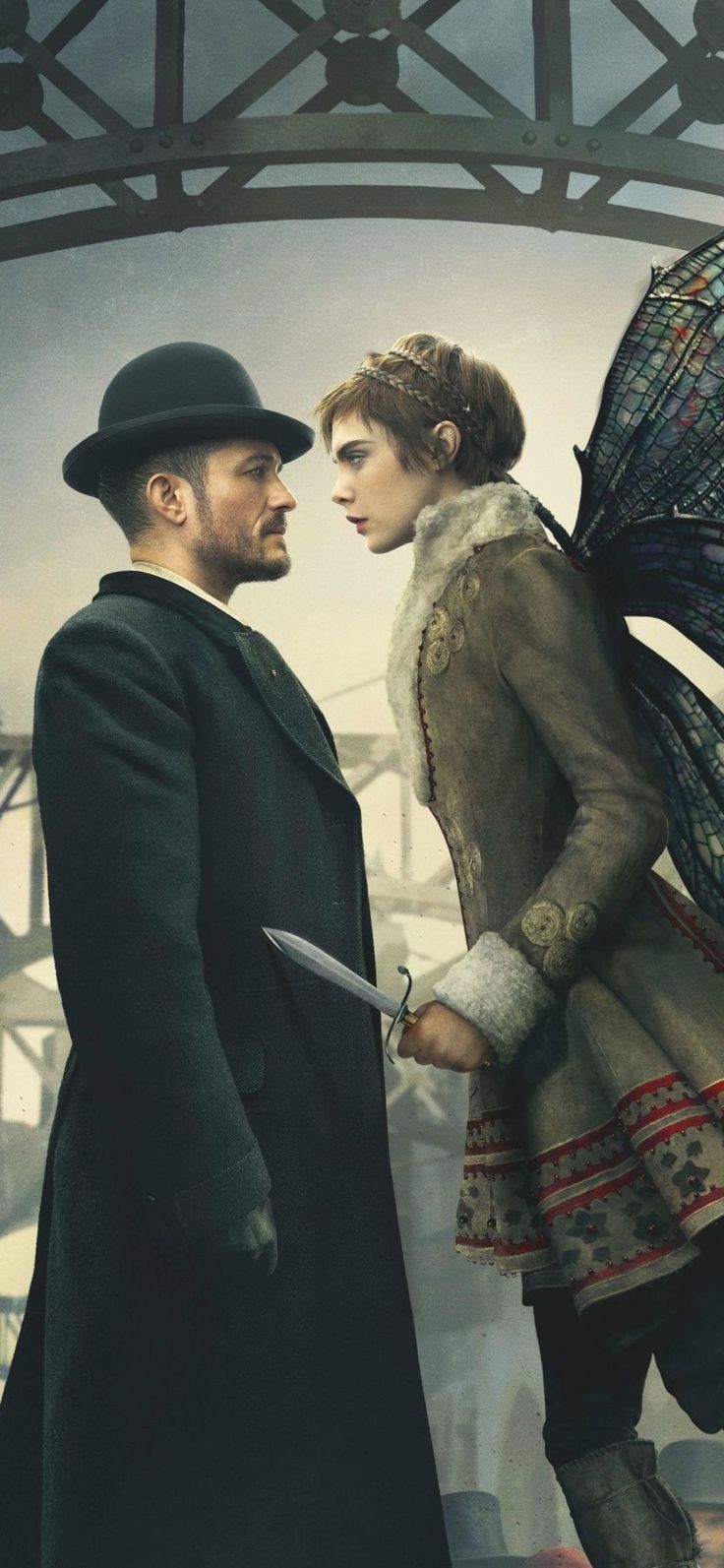

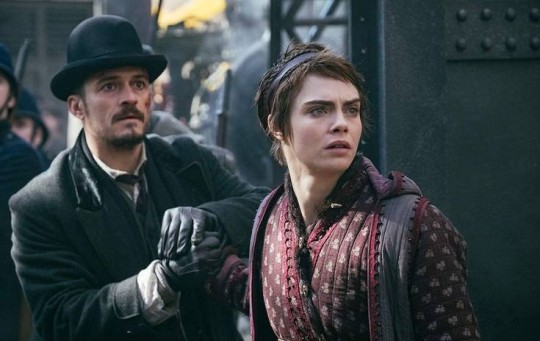
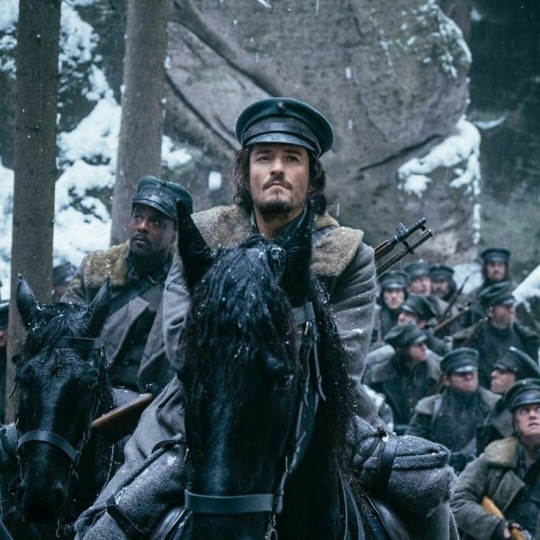
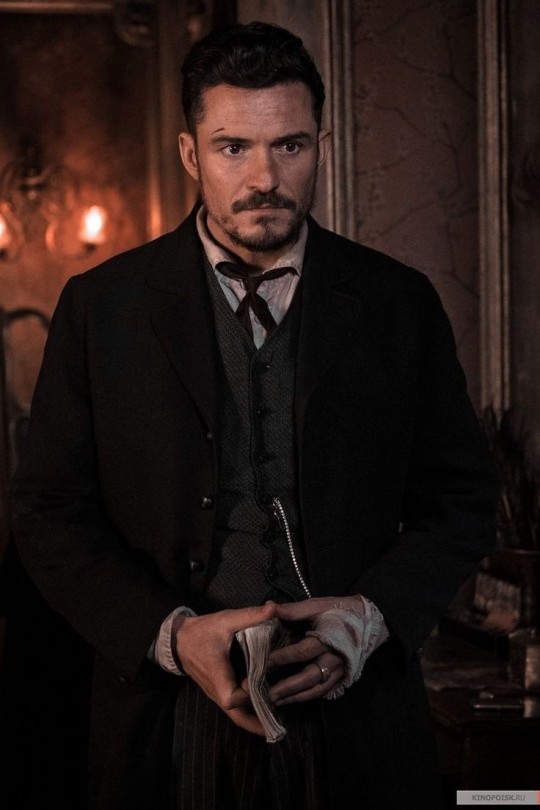
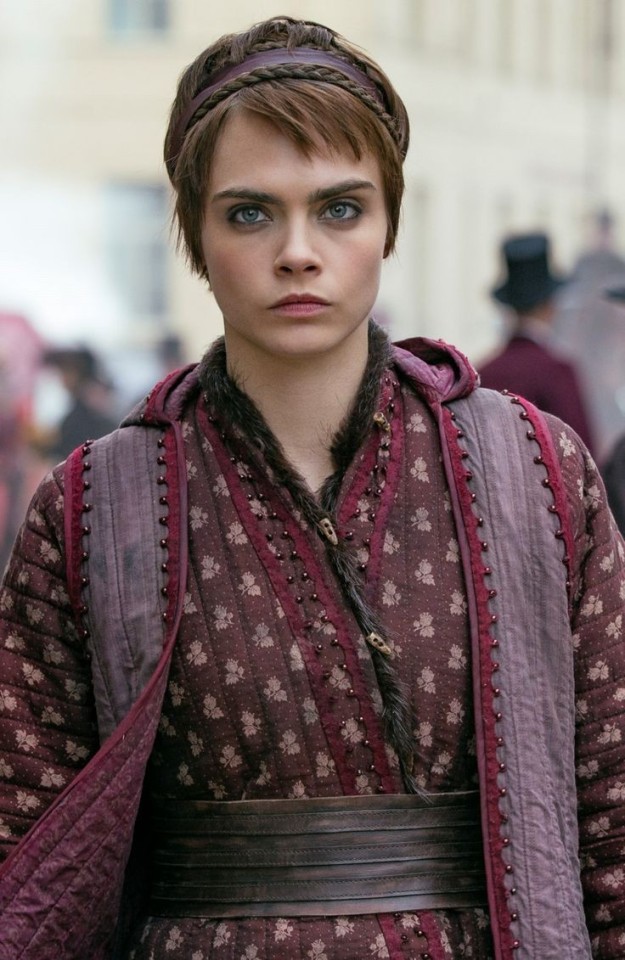
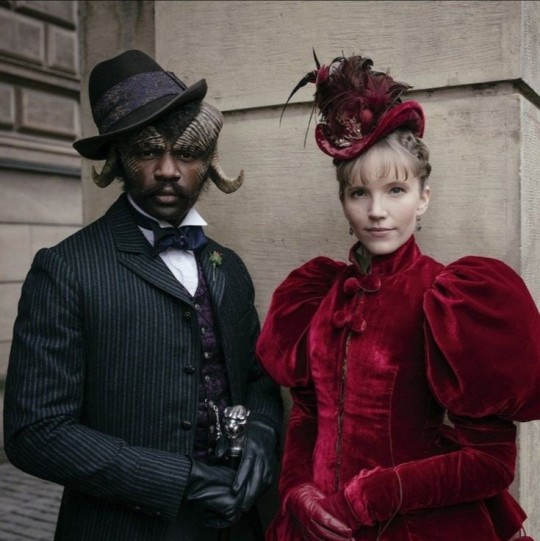
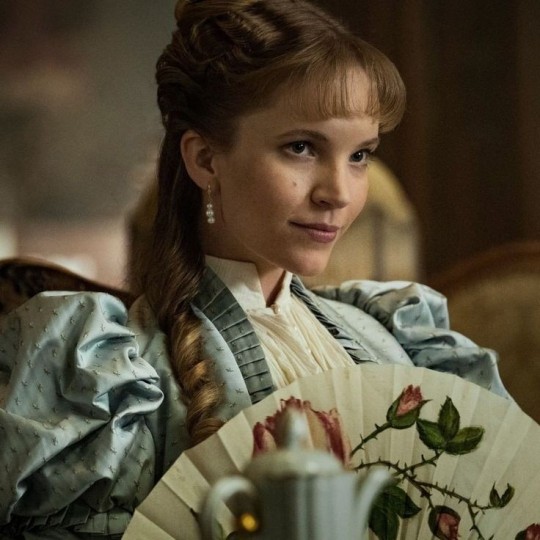
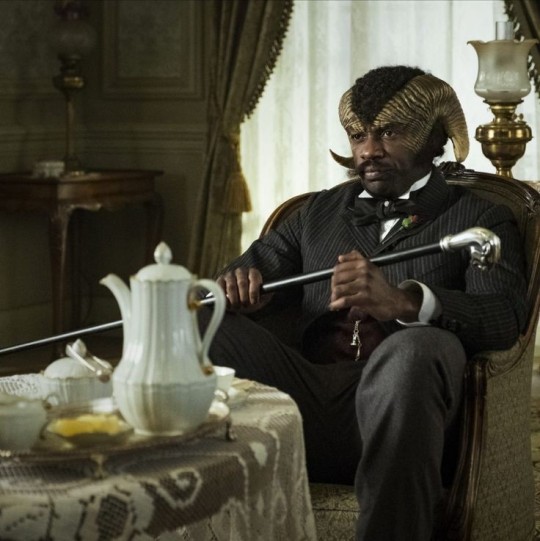
CARNIVAL ROW (2019-2023)
created by travis beacham and rené echevarria
11 notes
·
View notes
Text
“Star Trek: Deep Space Nine” s6e15 (1998)
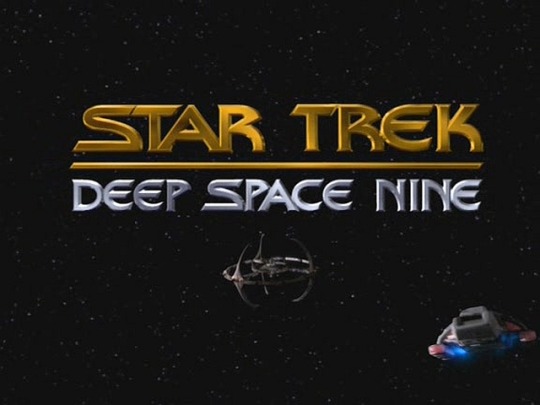
Honor Among Thieves, teleplay by René Echevarria.
DS9 does Wiseguy! With Nick Tate and Colm Meaney, two of my favourite actors, as in the equivalent of the Sonny and Vinnie roles.
For me, it's a terrific take on the idea. No surprises, because we've seen it done on many cop shows before, but it's great to see this story done so well in Star Trek.
My 785th episode of Star Trek, out of 893.
My 690th TV episode of 2023. Averaging 1h57m of TV every day.
9/10
2 notes
·
View notes
Text
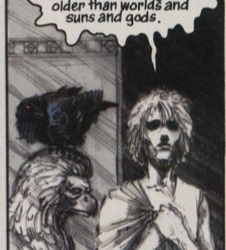

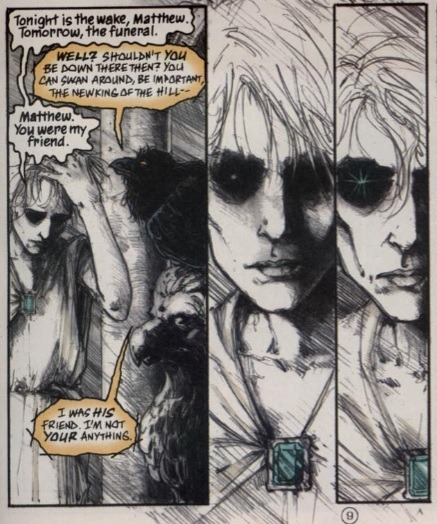

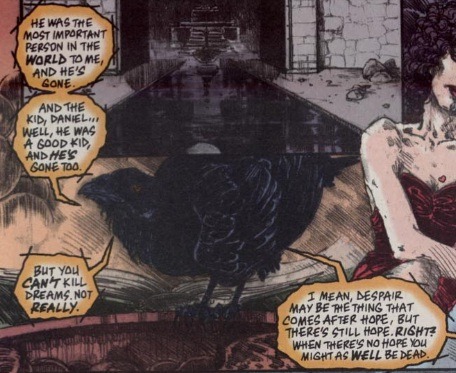

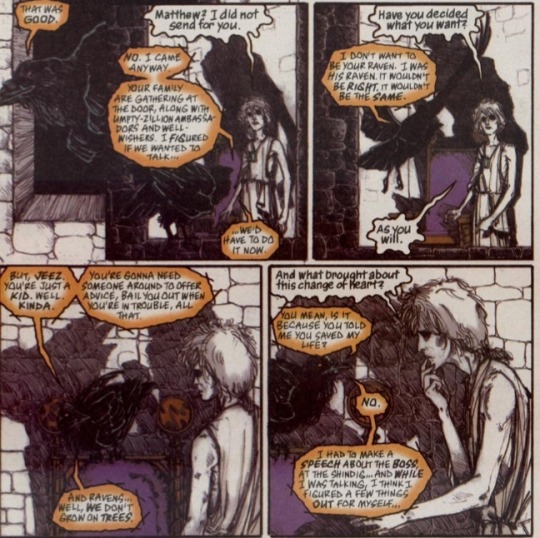

The Wake, Neil Gaiman 1996// Afterimage, René Echevarria 1998
Bonus: the kindly ones/rejoined
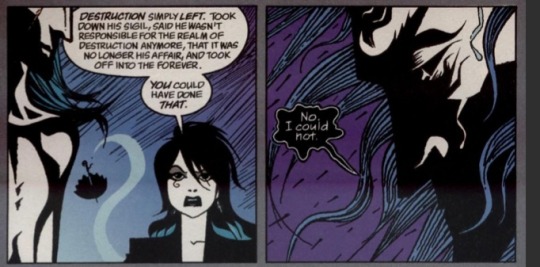

#its messy but i made the post it was making me too crazy#daniel hall#sandman comics#sandman spoilers#sandman comics spoilers#ds9#ezri dax#ds9 spoilers#while were tagging spoilers for things that came out in the 90s#DOES THIS MAKE SENSE AM I MAKING SENSE HERE#that last one especially may be TOO galaxy brained#daniel
16 notes
·
View notes
Text
like im not gonna do it but i still do think it would be kinda funny to message rené echevarria on linkedin to be like hey man i wrote your episode
#tbQh I regret not writing it in screenplay format I think the pacing comes off as weird for prose#but I could tell you where the opening credits roll yknow#anyway whatever not the point#personal#ish#every couple weeks I just rotate los in my head again he is so dear to me
3 notes
·
View notes
Text
The begotten was such a heart wrenching epiosde. God damn it all.
Odo's "it's just a baby" at the beginning. That started it all. René Echevarria will be paying for my therapy.
0 notes
Text
Well, I guess if Lower Decks represents a case study of how well-served René Echevarria has been by TNG's writer's room, Journey's End just kind of serves to show that Ronald D. Moore has really reached the point where he would be much better served by writing on Deep Space Nine...
Which fits, I suppose, since this is his penultimate writing credit on the show, with the last one being the literal series finale.
Like, it's surreal to think that the Maquis storyline started on TNG, the show that was arguably least well-suited to this kind of fundamental distrust in Starfleet and the Federation. That is, of course, Deep Space Nine's ballgame - Sisko pun definitely intended - and even though Moore feels like the TNG staff writer most in tune with that ethos, he has yet to make the leap.
This sense that he's fighting an uphill battle against the very character of the show is reinforced from a very early stage, with Picard's attempts to offer up canapés and tea as a peace offering to Admiral Nechayev serving as an effective microcosm of why this kind of story won't work on TNG.
No matter how far Picard gets pushed away from his faith in Starfleet, that faith is too unswerving to ever allow him to make a speech like Sisko's from The Maquis, Part II - the two-parter that is, of course, effectively the direct successor to this story some four weeks later, and does a much better job at handling these themes.
Picard is a great protagonist, and Patrick Stewart does a frankly incredible job selling him as a character who incrementally and almost imperceptibly opens up over the course of the show, to the point where Moore's eventual decision to close on the poker game in All Good Things... has much more weight than it might otherwise, but this is largely a tacit and unspoken evolution in comparison to Sisko's more material growth.
On top of all of this, there is of course the stuff with Wesley and the Traveller which... well, whatever can be said about Where No One Has Gone Before's suggestion that Wesley was an amazing wunderkind, at least it didn't see the need to heap on a weird, appropriative New Age treatment of Native American belief systems and culture a la Dances with Wolves or The Last of the Mohicans.
(Then again, this is all really just hearkening forward to Voyager's woefully ill-advised treatment of Chakotay's heritage as a generic hodge-podge of crude and stereotypical pop cultural depictions of Native Americans, but I'm sure I'll get into that if I ever do a similar write-up like this for a Voyager episode. Maybe Tattoo...)
And don't even get me started on the way the episode just kinda throws in a blood-stained past for the Picard family in such a cursory way that it really just feels like a means of reassuring the audience about their own white guilt...
Anyway, I don't much like Journey's End. Exceedingly controversial take, I know. Maybe some day I'll do some proper reviews of Star Trek episodes, people seemed to like the Lower Decks piece.
(TBH, I mostly just felt a bit guilty over giving so much focus to DS9, so I wanted to get some TNG pieces in before the close of the show. Hope you liked this nonsense, Trek seems to be what most people are here for anyway, but I like talking about it, so I ain't complaining at all.)
#star trek#star trek tng#star trek ds9#maquis#ronald d. moore#jean-luc picard#wesley crusher#chakotay#star trek voy#journey's end#but not the doctor who one
1 note
·
View note